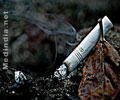A link between smoking and a reduced risk for a rare benign tumour close to the brain is confirmed by researchers.

But men in the study who used snuff, which produces roughly the same amount of nicotine in the blood as smoking, had no reduced risk of tumour development.
"We see this effect with current smokers but don't see it with current snuff users, so we think that maybe the protective effect has something to do with the combustion process or one of the other chemicals in cigarettes that are not in snuff," said Sadie Palmisano, a doctoral student in epidemiology at Ohio State University and lead author of the study.
"We learned something from exclusion."
Acoustic neuroma is a tumour that grows on the vestibular cochlear nerve connecting the ear to the brain. It is not cancer, but it can cause nerve damage as well as symptoms that include vertigo, ringing in the ears and hearing loss.
The only treatment for these slow-growing tumours is surgical removal or high-powered radiation that reduces their size. About one in 100,000 people per year develops these growths, which account for approximately 8 percent of all primary tumours inside the skull in the United States.
Advertisement
Though the research is aimed at prevention of acoustic neuromas, the researchers emphasized that they do not endorse smoking as a way to avoid developing a tumour.
Advertisement
These are called Schwann cells, and they produce the myelin coating on nerve cells in the peripheral nervous system outside the brain and spinal cord.
The scientists conducted a nationwide study of acoustic neuroma between 2002 and 2007, compiling data on Swedish patients between the ages of 20 and 69 years at the time of diagnosis with the tumours.
These patients, as well as healthy Swedish control participants, also completed questionnaires about environmental exposures and lifestyle choices.
Palmisano and colleagues applied statistical analysis to these data to determine associations between smoking and snuff use and risk for acoustic neuroma. The analysis included data on 423 patients with tumours and 645 controls matched for age, sex and home location.
A few previous studies have found a similar link between smoking and lowered risk for development of these tumours, but did not take snuff use into account.
"We got practically all of the diagnosed cases in Sweden - there was an 84 percent participation rate. On top of that, a population-based registry served as the basis for the control sample. This made it incredibly representative of the population, and with the sample being this large, we make the case that the link between smoking and reduced risk for acoustic neuroma is there," Palmisano said.
The link was especially strong in men who were current smokers - a 59-percent reduction in risk for acoustic neuroma compared to people who had never smoked. In women current smokers, the association was smaller - a 30 percent reduced risk compared to never-smokers, with more statistical room for this link to be attributed to chance.
Current smokers were those who smoked at least one cigarette per day for six months or longer. For people who had smoked and then quit, including even longtime smokers, "we didn't find as much of an effect. It's like a puzzle," Palmisano said.
The researchers evaluated smokeless tobacco use among only men because too few women reported using snuff. The scientists found no difference in the risk for acoustic neuroma between current or past snuff users and people who had never used snuff.
These findings about snuff imply that nicotine is not providing the protection because habitual snuff users and smokers have similar levels of nicotine in their blood.
By determining that snuff users reap no acoustic neuroma preventive benefits from the smokeless tobacco, the researchers determined that nicotine should probably be ruled out as a potentially protective compound in this context.
The Swedish and American forms of snuff differ substantially, so these findings do not translate to users of American smokeless tobacco, which is fermented and contains more chemicals than does Swedish snuff.
The research is published online and scheduled for future print publication in the American Journal of Epidemiology.
Source-ANI















